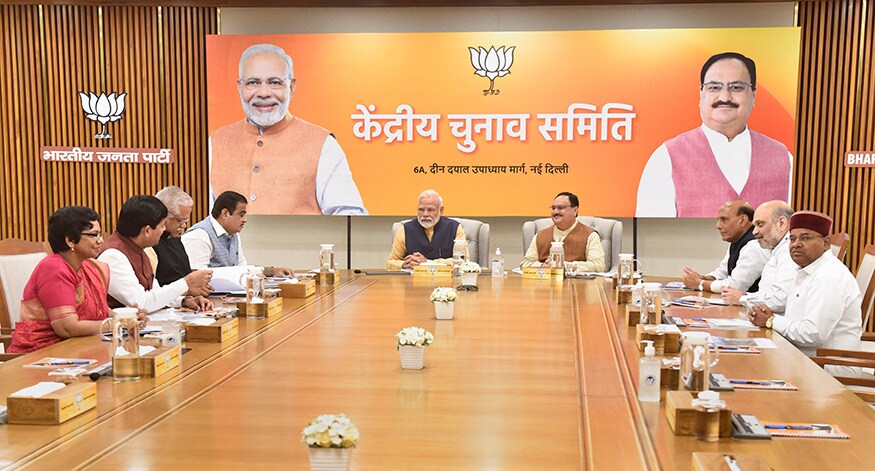Image Source: News18
The Bharatiya Janata Party (BJP) is gearing up for the upcoming Lok Sabha elections, and held a crucial meeting of its Central Election Committee (CEC) on Saturday. This pivotal gathering will serve to determine the party’s candidate selections for the impending electoral battle. Among the notable attendees were Prime Minister Narendra Modi, BJP President JP Nadda, Home Minister Amit Shah, Defence Minister Rajnath Singh, Uttar Pradesh Chief Minister Yogi Adityanath, as well as Uttar Pradesh Deputy Chief Ministers Brijesh Pathak and Keshav Prasad Maurya, alongside other esteemed members of the committee.
With the release of four lists thus far, encompassing a total of 291 party candidates, the BJP has been diligently strategizing and deliberating over its electoral lineup. The most recent list unveiled the names of contenders hailing from Tamil Nadu, a state poised for polling in the initial phase of the elections, slated to commence on April 19.
The electoral process for the 543 Lok Sabha seats is set to unfold across seven phases, commencing on April 19 and culminating on June 1. An astounding electorate of nearly 97 crore individuals stands eligible to exercise their democratic right and participate in shaping the nation’s future.
Amidst the fervor of electoral preparations, numerous political parties have unveiled their preliminary candidate rosters, marking the onset of what promises to be a dynamic and fiercely contested electoral season. As the political landscape brims with anticipation and speculation, the BJP-led National Democratic Alliance (NDA) emerges with a resolute ambition—to secure an emphatic victory by clinching over 400 seats in the Lok Sabha.
This formidable target underscores the BJP’s unwavering determination and strategic vision as it aspires to consolidate its electoral dominance and steer the nation towards a trajectory of progress and prosperity. Anchored by a formidable leadership cadre comprising Prime Minister Narendra Modi and an array of seasoned stalwarts, the BJP embarks on the electoral fray with a blend of confidence and purpose, buoyed by its track record of transformative governance and unwavering commitment to the welfare of the masses.
The impending electoral showdown is not merely a contest of political ideologies but a pivotal juncture wherein the electorate’s aspirations, hopes, and dreams converge. As the nation braces itself for the democratic spectacle, the BJP stands poised to articulate its vision, articulate its vision, connect with the electorate, and propel the nation towards a future defined by inclusivity, development, and resolute leadership.
Against the backdrop of a rapidly evolving political landscape, the BJP’s quest for electoral supremacy symbolizes a pivotal chapter in India’s democratic journey—one characterized by resilience, dynamism, and the enduring spirit of democracy. As the countdown to the elections commences, the nation awaits with bated breath, poised to witness the unfolding of a momentous chapter in its democratic saga—a chapter wherein the collective will of the people finds expression and the destiny of the nation is shaped anew.
Table of Contents
BJP to support other regional parties in Meghalaya, Manipur and Nagaland

Image Source: IBC24
The Bharatiya Janata Party (BJP) recently made a significant announcement regarding its strategic alliances in the northeastern region of India. The party revealed its intention to throw its support behind its regional allies contesting in four Lok Sabha constituencies spread across three states. These constituencies include Shillong and Tura in Meghalaya, Outer Manipur in Manipur, and the sole constituency in Nagaland.
According to Sambit Patra, the BJP’s coordinator for the northeast, the party will back the Lok Sabha candidates of key allies: the National People’s Party (NPP) in Meghalaya, the Nationalist Democratic Progressive Party (NDPP) in Nagaland, and the Naga People’s Front (NPF) in Manipur. Notably, these three parties are integral members of the BJP-led National Democratic Alliance (NDA), emphasizing the coalition’s unity and collaborative approach in the region.
Patra expressed confidence in the electoral prospects of the BJP and the NDA, predicting a significant victory with over 370 seats for the BJP alone and surpassing the 400-seat mark for the NDA as a whole. This assertion underscores the BJP’s optimistic outlook and its determination to strengthen its political foothold in the northeast.
The National People’s Party (NPP) has nominated incumbent Agatha Sangma and Meghalaya Health Minister Ampareen Lyngdoh as its candidates for the Tura and Shillong seats, respectively. In Nagaland, the NDPP has fielded Chumben Murry, while the NPF’s candidate for Outer Manipur is Kachui Timothy Zimik. These nominations reflect the collaborative efforts between the BJP and its regional allies to put forward strong contenders for the upcoming Lok Sabha elections.
Furthermore, the BJP’s support extends beyond these four constituencies. In Assam, the party is endorsing candidates from its ruling partners, the Asom Gana Parishad (AGP) for the Barpeta and Dhubri seats, and the United People’s Party Liberal (UPPL) for Kokrajhar. This demonstrates the BJP’s commitment to fostering alliances and consolidating its political alliances across various states in the northeast.
Overall, the BJP’s announcement signifies its strategic maneuvering and alliance-building efforts in the northeastern region, aiming to secure electoral success and strengthen its position within the National Democratic Alliance (NDA).



